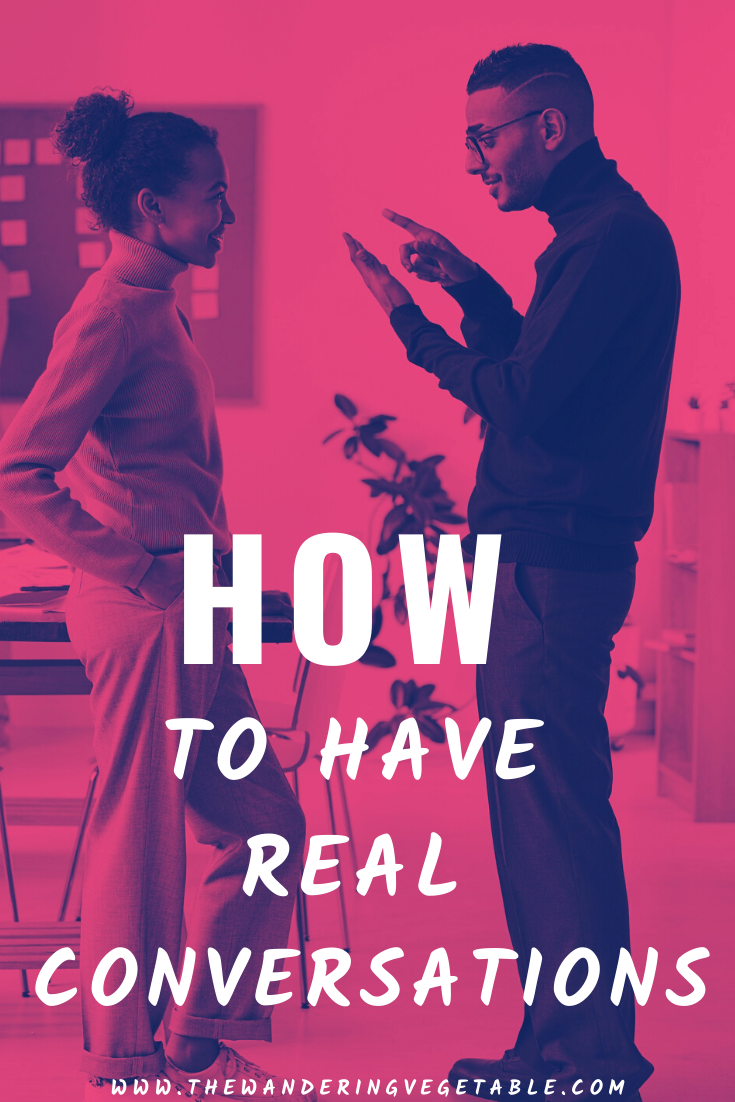
"Hey! How are you?", "I'm good, thanks, and you?", "I'm good too". The end. This is how we converse in real life on a daily basis. By putting closure to everything, we are making very little effort to have a real meaningful conversation. And less meaningful social interactions lead to weaker social equations, lack of personal growth, and poor mental health. Therefore, we need to find ways to escape from the clutches of small talk and revive the art of having a conversation. We need to learn how to have real conversations.
Think about it. When was the last time somebody asked you - "How are you?" and you actually replied what you felt like at that very moment? Can't recollect it right? That's the exact problem I'll be discussing in this blog article.
Our interpersonal skills have nosedived into the depths of shallowness and surface talk. That's why most of the "Tinder profiles" and "Matrimonial site profiles" are searching for people who possess the art of having a stimulating conversation. Because good conversation is such a turn on.
And yet it's these same people who reply "I'm good/fine" to every "How are you?", as if on an automated answering machine mode. There's irony having an orgasm.
HOW I LEARNED TO HAVE REAL CONVERSATIONS THROUGH AN EXERCISE

I was attending this acting workshop called "The Actor's Truth" after returning to Mumbai to continue my journey as an actor who's also a travel blogger. All sixteen of us had assembled in the acting space where the workshop was to take place.
Our mentor for the course Mr. Saurabh Sachdeva introduced himself and then specifically went on to ask "How are you?" to each one of us. And oddly enough, most of us had replied: "I'm good/great".
What was worse, was that some of us didn't seem like we were doing good/great by the expression on our faces or our body language. Yet our answers were similar. Our words contradicted our moods and emotions. It felt like we were all the same. The situation reminded me of the sarcastic quote - "You are unique, just like everybody else".
Then we went on to do an ice-breaking activity that opened us up as it involved a bit of physical movement and interaction. Post the activity, our mentor again asked us the question - "How are you?"
However, this time each one of us had a different answer - tired, feeling hot, warmed up, energetic, light, happy, exhausted, injured, etc., were some of the responses. And these responses got a different reaction from our mentor who was now interested in our individualistic feeling. We were genuinely connecting to him on a human level. We were finally understanding the purpose of the "How are you?" acting exercise.
Although we did go on an alert mode after one of us replied "I feel pukish" but hey, at least it was a stark improvement from the word "good" that we constantly keep using to answer the question.
HOW BEING DESCRIPTIVE HELPS TO HAVE REAL CONVERSATIONS
I think good and nice are two words that were invented by the laziest guys on the planet. Why? Because they are decorative convenient words that don't tell you anything specific. They just provide quick closure to anything.
A nice guy, good food, a good movie are generic terms that we use on a daily basis. Compare them with a temperamental but soft-spoken and honest guy, flavoursome spicy food, an edge of the seat thriller respectively. What gives you a clearer impression and clarity of thought? The latter statement. Because it's descriptive, it creates a picture in your head and appeals to your imagination.
When someone is descriptive and specific with respect to their opinion on a topic, then it captures your attention as the conversation is humanized. You feel like taking the discussion forward and contributing your views on the topic as well. Generic words don't do the conversations any favours as they act like dead ends to a potentially good conversation.
As kids, we were all so expressive, clear, and imaginative. That's what drew people towards us and made us likeable. Then what happened to us on our way to adulthood?
Our social conditioning of being "good, proper, presentable" at all times and the pre-conceived notion that the other person isn't interested in us, are the two primary reasons why we fall in the trap of shallow conversation.
HOW HUMANIZING A CONVERSATION GOT ME SUCCESS

I'm an actor and being an actor in Mumbai involves making many rounds to various casting offices day-in & day-out in search of quality work. Making contacts is one thing that everybody kept telling me to do as if it were a chapter in the "Actor's Bible".
I failed to understand how does one "make a contact and stay in touch" in a way that doesn't irritate the other person. Because when you're in search of work, then a casting director is the sole connecting bridge between you and a good project. So this was my interaction with a reputed casting director 4 years back -
"Hello, Sir! I'm Vaibhav. I spoke to you over the phone."
*handshake*
"Oh yes! Hi, nice to meet you Vaibhav. How are you?"
"I'm good sir, thanks. And you?"
"I'm great. You can go to my casting assistant and record your introduction. Have a good day."
"Sure sir. Thanks, and you too!"
This is where it ended and I never got to see the casting director again. I didn't get any callback from his office and hence, I never got a project from his casting company. Now, where did I lose out?
I lost it in my first interaction with him itself. When a person in power like him meets hundreds of aspiring actors like me in a day, an aimless on-the-surface formal interaction isn't going to make him remember me. That's how the thousands of actors he meets in a month, interact with him as well.
I didn't have a quality interaction with him as I didn't give him a glimpse of my -
- Personality,
- Vulnerability
- Sense of humour,
- Skill-set that I'd developed besides acting &
- My family and acting background.
And therefore, I didn't sell him my unique selling point. Then how do I expect him to remember me and give me work?
Cut to a recent interaction I had with a casting director which went like this-
"Hello, Sir! I'm Vaibhav."
*handshake*
"Great to have you at my office Vaibhav, tell me how are you?"
"I'm nervous Sir as you can tell from my sweaty palms. Just hoping to not screw my case of being cast in your next project."
The casting director laughed, tried to calm me down, and then asked me about my childhood, family background, acting training, and life in general. My one moment of honesty had humanized me in front of him and he felt an instant connection with that quality and wanted to know more about me.
I recently bagged a project through him. That's the difference that a genuine, heartfelt interaction makes. It humanizes and sensitizes the person towards you and makes them want to have a real conversation with you. It makes them relate to you and reach out to help you if you're in need. Your admission of vulnerability makes you different from all the other robots who are "good" no matter what's going on in their life.
That's the level we should be interacting at if we are to have a peer group where people actually care about us and vice versa. This is how a constructive social circle is made. Not by partying every weekend, clicking selfies and forgetting the person until the next weekend when you're bored again.
WHAT IF PEOPLE AREN'T INTERESTED TO HAVE REAL CONVERSATIONS?

But why should I open up and speak about my feelings? What if the other person is not interested?
- Firstly, that's an assumption you are making out of your inner fear of rejection. You're cancelling out the possibility of a fruitful conversation in your head even before it happens in reality. So shut those negative voices in your head and speak your mind.
- Secondly, if the person asking you a question isn't interested in hearing the answer or having a real conversation, then even better! Such people make your work of eliminating negative superficial people from your life a smoother process. You don't want people who are friends for namesake anyway, do you?
So what you might assume as a con is also a disguised pro as it helps you build better connections that are emotionally fulfilling. And an emotionally stable person is a happy person. No one ever died of happiness, did they?
CONCLUSION
Say what's on your mind. Respect your emotions and admit to them. Live them with honesty. No point wearing a cloak of bravery when all the bottled emotion in you is creating a tornado of discomfort. Don't indulge in small talk. Put a price on your words and have real conversations with people.
See what difference it makes when you acknowledge your mood, feelings, and emotions. You'll create a positive vibe around you. You'll feel much lighter and sleep much better. Try it. Go ahead. But before that, I wanted to ask you a question - "How are you?"
SHARE the post "How To Have Real Conversations? - Let's Humanize Conversations" with your friends, family, and social circles to spread this necessary message and help them build better social connections.
PIN the image below to share the post "How To Have Real Conversations? - Let's Humanize Conversations" with your followers and save it for reading later. Also, SUBSCRIBE to "The Wandering Vegetable" for more such 'Slice of Life' posts.

Posted from my blog with SteemPress : https://thewanderingvegetable.com/how-to-have-real-conversations/
I just meditated and took a shower so I'm feeling actually fine right now. Yesterday wasn't so great though. Thank you for asking. :)
Glad you're good. I hope your days are eventful and enjoyable :)
Likewise... :)